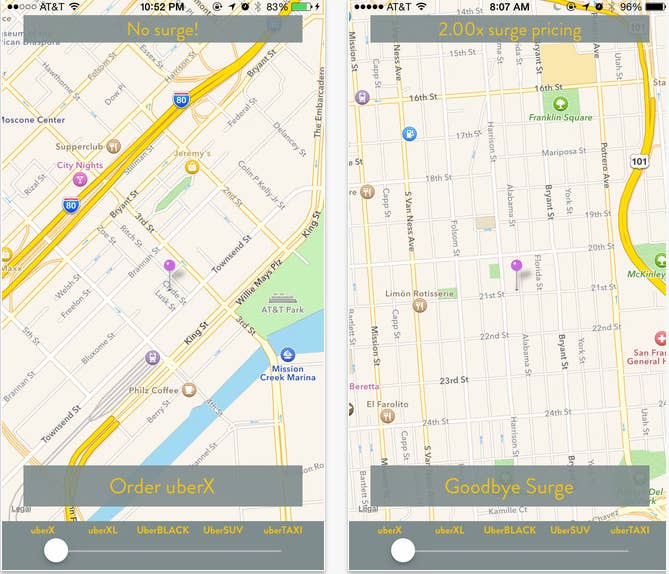
More and more consumers seem to be opting to use Uber, or similar services, to hail and pay for a ride. Now in 40 countries, the on-demand car service app was most recently valued at $18.2 billion. But for all the praise of Uber's convenience, there's a growing thread of complaints about Uber's surge pricing — a system the company put in place that raises the price of the base fare when there is a high demand but fewer supply of cars.
This past Halloween, to point to an extreme example of the pitfalls of surge pricing, a woman named Gabby hailed an Uber in Baltimore after a few drinks and agreed to a surge pricing of 9 times the base fare. For a 20 minute ride, Gabby was charged $362.57.
Now with the help of a new, free app called SurgeProtector that seemingly taps into the Uber API, Gabby and other Uber riders can skip the surge and find the nearest location that isn't surging. The app — just released yesterday — helps users order an Uber directly to the nearest non-surging spot for that cheaper-than-a-taxi fare that riders in some cities have grown accustomed to.
BuzzFeed News reached out to both Uber and the developer of the app for comment on the app and has yet to hear back.
If the app is indeed using Uber's API to circumvent the surge prices, Uber arguably has avenues to simply shut down access to SurgeProtector. The company is no stranger to criticism of its surge pricing model but continues to stand behind it. In a recent interview with Re/Code's Kara Swisher, co-founder and CEO Travis Kalanick defended the surge pricing model calling it "classic Econ 101."
"You want supply to always be full, and you use price to basically either bring more supply on or get more supply off, or get more demand in the system or get some demand out," Kalanick said.
Thomas Schmidt, one of the developers of the app, said that Uber has been in touch with Schmidt during the development of SurgeProtector and doesn't think it could hurt Uber's revenue.
"Uber's actually been super cool about SurgeProtector," Schmidt wrote via email. "We've been talking with them for the past two weeks about how we could better use their API - we were hitting the API call limit for a while - and they've accommodated our requests for a higher call limit. We'd be disappointed if they shut us down as we don't see SurgeProtector becoming big enough to make any significant impact in revenue."
"In fact, we think SurgeProtector could actually increase demand as the people who use SurgeProtector to get out of surge are probably part of a contingent that wouldn't have called a surge-priced Uber anyway," Schmidt continued.
Gabby requested an Uber ride in Baltimore. A previous version of this article misstated the city in which she requested the ride.
